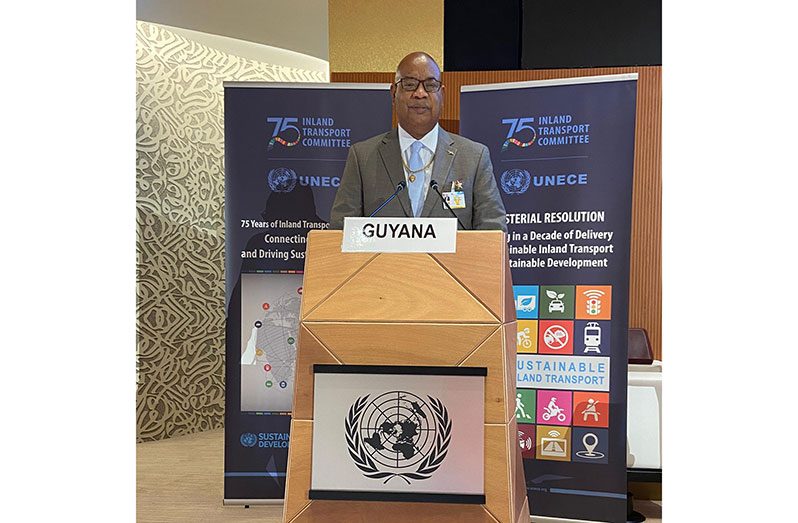— Minister Edghill tells Inland Transport Committee
COLLECTIVE and sustained efforts of governments and multilateral institutions must craft transport policies and allocate the financial and other resources in the most appropriate areas to stem or reduce the effects on the cost of global existence.
This is according to Minister of Public Works, Bishop Juan Anthony Edghill, during his keynote speech on the occasion of the 75th anniversary of the Inland Transport Committee observed on Tuesday in Geneva, Switzerland.
“I would like to use this platform I have been given today to add my voice and our country’s commitment to supporting the global efforts to combat the effects of the COVID-19 pandemic that threatens our individual and collective livelihoods,” he told the committee, while applauding the work of the Inland Transport Committee (ITC) over the years to promote sustainable development in transport.
This work continues, he said, and it is precisely why officials this week will engage in dialogue and exchange ideas, as well as firmly commit through the signing of the Ministerial Resolution to move along the spectrum from words to firm actions.
The transport sector is one of the major contributors of CO2 emissions as well as a major energy consumer.
In this light, Minister Edghill said that in order to assess sustainability of the transport sector, it is necessary to assess its trends and projections concerning carbon emissions and energy use.
Key issues that affect Latin America and the Caribbean, he added, are the rapid expansion of vehicular fleets, particularly of vehicles used for personal transportation, at a time when the roadway network has not kept pace with that expansion.
CHALLENGE
For the governments of many cities, he noted that this has made mobility both a challenge as well as a high-priority issue in terms of comfort, transit times and air pollution.
Adding that this is acutely prevalent in Latin America, Minister Edghill said that another evident trend in Latin America is the rising use of diesel fuel by automobiles, primarily because the price of diesel is usually lower than gasoline and because there is an increased usage of sport utility vehicles — many of which are diesel-fuelled.
“As we embark on the next steps for implementing the global plan for sustainable inland transport, every stakeholder — including and especially all our governments and multilateral institutions must leverage our strengths and influences and take honourable actions in this decade that will have a lasting positive impact on the macro-economic stability of our livelihoods today and for generations to come,” he underscored.
He said the theme of this year’s Diamond Jubilee: “Ushering in a decade of delivery for sustainable inland transport and sustainable development” is most fitting for the current challenges of this era.
ADEQUATE FRAMEWORK
This theme, he said, provides an adequate framework to address the global transport challenges many countries have faced since the outbreak of the COVID-19 pandemic in late 2019, early 2020.
“I have no doubt that if we deliver a coordinated and sustained response to the global challenges of inland transport like we did in our efforts to combat COVID-19 then at the end of this decade, history will judge us with favourable consideration. As a cross-cutting sector, transport plays an important role in efforts towards achieving the 2030 sustainable development goals,” he posited.
In addition to their value and job creation, he said that the inland transport systems should be considered partly as enablers of sustainable development.
Therefore, he added the integrated approaches to policy making is imperative, including planning for land use, infrastructure development, public transport systems and goods’ delivery networks for the provision of affordable, efficient, safe and secure transport, improving energy efficiency, and at the same time reducing pollution and congestion.
“Transport is the metal reinforcement that holds the supply chain together. Every step of the process is connected through transportation. It is transportation that moves raw materials from deposits where they are extracted, to the place where they are manufactured, to the distributors and finally to the consumers. If we do not have an economically stable transport plan in place, a lot of money is lost, which diminishes our competitive advantage,” Minister Edghill said.




.jpg)









